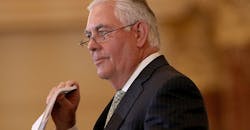Exxon Fined for Russia Sanctions Violations Under Tillerson
The Treasury Department fined Exxon Mobil Corp. $2 million for “egregious” violations of sanctions against Russia when now-Secretary of State Rex Tillerson was chief executive.
Exxon violated Ukraine-related sanctions by signing eight legal documents related to oil and gas projects in Russia with Igor Sechin, head of Rosneft OAO, who is on Treasury’s list of sanctioned Russian nationals. The violations occurred from about May 14-23, 2014, while Tillerson led the company, Treasury’s Office of Foreign Assets Control said in a statement released Thursday.
Exxon “did not voluntarily self-disclose the violations,” which “constitute an egregious case,” according to the statement. “Exxon Mobil’s senior-most executives knew of Sechin’s status” as subject to the sanctions when the documents were signed, the Treasury Department statement said.
U.S. and European nations imposed sanctions to punish Vladimir Putin’s regime for its actions in Ukraine. Among those targeted was Rosneft’s Sechin. Measures from President Barack Obama’s administration included asset freezes and bans on travel to the U.S.
Russia is Exxon’s biggest oil exploration region worldwide.
Exxon Calls Fine 'Unfair'
A spokesman for Exxon, Scott Silvestri, called the Treasury Department fine “fundamentally unfair” to the oil company.
Silvestri said in a statement that the company “followed the clear guidance from the White House and Treasury Department when its representatives signed documents involving ongoing oil and gas activities in Russia with Rosneft,” noting that the company itself wasn’t under sanctions. Sechin “countersigned” the documents ”in his official representative capacity,” Silvestri said.
“Each of the legal documents cited by OFAC solely related to Rosneft’s business,” Silvestri added.
In an analysis accompanying the statement on Exxon, Treasury said the sanctions against Sechin were stated in “plain language,” prohibiting Americans from all business interactions with him, and that the department provided context for the policy in the early days of the Ukraine crisis, leaving little room for misinterpretation. Sechin was added to its sanctions list on April 28, 2014.
The State Department declined to comment on Tillerson’s behalf, referring questions to Treasury and Exxon.
The fine puts Tillerson in an awkward position because he has, during his tenure as secretary of state, issued several strongly worded statements about the need to keep sanctions against Russia in place over the lack of progress toward a resolution to the Ukraine crisis.
He visited Kiev on July 9, meeting with President Petro Poroshenko and lending his support to the country.
“The U.S. and EU sanctions on Russia will remain in place until Moscow reverses the actions that triggered these particular sanctions,” he said at the time.
During his tenure as CEO of the world’s largest publicly-traded oil explorer, Tillerson opposed unilateral sanctions. The U.S. sanctions were more sweeping than those imposed by the European Union, a situation that rankled Tillerson because he said it allowed European competitors to continue drilling for Russian oil when American firms such as Exxon could not.
As part of his confirmation as Secretary of State, Tillerson agreed to recuse himself from all matters directly related to Exxon for the first year of his tenure and to seek legal advice on whether to do so after that.
Tillerson also demonstrated an understanding of the complexities of the Ukraine sanctions during his confirmation hearing, telling senators that some of Exxon’s Russia holdings were not affected by the sanctions even though they were agreed to with Rosneft. He acknowledged the company “does contain individuals who are subject to the sanctions.”
The executive who signed the documents with Sechin was Neil Duffin, at the time president of Exxon’s development unit. He’s now president of the company’s production arm. Another executive, Stephen Greenlee, was present when the documents were signed. He is president of Exxon’s exploration unit, a position he held at the time.
Treasury’s fine is the maximum penalty for such violations, doled out after it said Exxon “demonstrated reckless disregard” and caused “significant harm” to the Ukraine sanctions program. The department said Exxon is a “sophisticated and experienced” company that should have considered warning signs in dealing with sanctioned individuals.
The company reported $7.84 billion last year, down from $32.52 billion in 2014, when the violation occurred.
By Saleha Mohsin, Joe Carroll and Nick Wadhams
About the Author
Bloomberg
Licensed content from Bloomberg, copyright 2016.
